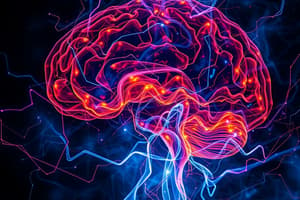Podcast
Questions and Answers
According to the psychodynamic approach, where in the mind would memories of happy school days be stored?
According to the psychodynamic approach, where in the mind would memories of happy school days be stored?
Conscious
What is the name of the part of the mind that operates on the pleasure principle, seeking immediate gratification?
What is the name of the part of the mind that operates on the pleasure principle, seeking immediate gratification?
Id
What is the name of the part of the personality that develops around the age of 2 and mediates between the id and the superego?
What is the name of the part of the personality that develops around the age of 2 and mediates between the id and the superego?
Ego
According to Freud, what is the main driving force behind human behavior?
According to Freud, what is the main driving force behind human behavior?
What is the name of the part of the personality that is based on the morality principle, representing our internalised sense of right and wrong?
What is the name of the part of the personality that is based on the morality principle, representing our internalised sense of right and wrong?
What is the significance of childhood experiences, according to the psychodynamic approach?
What is the significance of childhood experiences, according to the psychodynamic approach?
According to the psychodynamic approach, what part of the personality would be most likely to say "I want that cake right now!" in the scenario of someone walking past a cake shop after missing lunch?
According to the psychodynamic approach, what part of the personality would be most likely to say "I want that cake right now!" in the scenario of someone walking past a cake shop after missing lunch?
What part of the personality might be more likely to say "I should keep walking and eat later" in the cake shop scenario?
What part of the personality might be more likely to say "I should keep walking and eat later" in the cake shop scenario?
Describe Freud's concept of the unconscious mind in relation to conscious awareness.
Describe Freud's concept of the unconscious mind in relation to conscious awareness.
What are the three main components of personality according to Freud?
What are the three main components of personality according to Freud?
According to Freud, what are the three parts of the personality?
According to Freud, what are the three parts of the personality?
Explain the connection between Freudian slips and the unconscious mind.
Explain the connection between Freudian slips and the unconscious mind.
In Freud's model of the mind, which part of the personality is thought to be largely unconscious?
In Freud's model of the mind, which part of the personality is thought to be largely unconscious?
What is the role of the therapist in the psychodynamic approach to understanding the unconscious?
What is the role of the therapist in the psychodynamic approach to understanding the unconscious?
How does the psychodynamic approach differ from other approaches to psychology, such as behaviorism?
How does the psychodynamic approach differ from other approaches to psychology, such as behaviorism?
What are some criticisms of the psychodynamic approach?
What are some criticisms of the psychodynamic approach?
Flashcards
Psychodynamic Approach
Psychodynamic Approach
A theory focusing on the unconscious mind influencing behavior, established by Freud.
Freud's Iceberg Model
Freud's Iceberg Model
The mind is like an iceberg, where most of it is unconscious, hidden under the surface.
Id, Ego, Superego
Id, Ego, Superego
Freud's model of personality structure: id is primal desires, ego is reality, superego is morals.
Unconscious Mind
Unconscious Mind
Signup and view all the flashcards
Freudian Slips
Freudian Slips
Signup and view all the flashcards
Childhood Events
Childhood Events
Signup and view all the flashcards
Psychoanalysis
Psychoanalysis
Signup and view all the flashcards
Conscious vs Preconscious
Conscious vs Preconscious
Signup and view all the flashcards
Id
Id
Signup and view all the flashcards
Ego
Ego
Signup and view all the flashcards
Superego
Superego
Signup and view all the flashcards
Pleasure Principle
Pleasure Principle
Signup and view all the flashcards
Reality Principle
Reality Principle
Signup and view all the flashcards
Morality Principle
Morality Principle
Signup and view all the flashcards
Internalized Morality
Internalized Morality
Signup and view all the flashcards
Study Notes
The Psychodynamic Approach
- Freud's psychodynamic approach studies the mind subjectively, focusing on unconscious drives and childhood experiences
- It rejects the objective study of the mind favored by Wundt
- Freud believed that the human mind is like an iceberg; the conscious mind is just a small part, with the vast majority existing in the unconscious
- The unconscious mind contains biological drives, desires, and memories
- The superego develops around age five, internalising societal norms and values
- The ego emerges around age two; it balances the id's desires with societal expectations, acting as a mediator between the two
- The id is present at birth and is driven by instinctual drives, primarily focused on immediate gratification
- Events in childhood can influence adult behaviour
- Behaviour is often driven by unconscious processes rather than conscious control
- People's behaviour is frequently outside their conscious control
- Behaviour is influenced by unconscious biological drives (desire for life, sex, food, jealousy, and destructive tendencies)
Studying That Suits You
Use AI to generate personalized quizzes and flashcards to suit your learning preferences.




